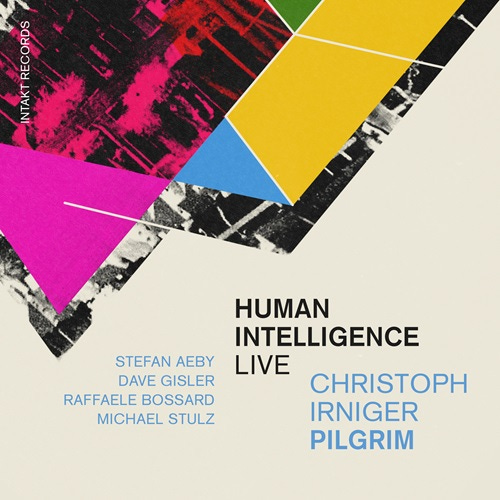Christoph Irniger & Pilgrim - Human Intelligence Live
(Intakt Records, 2025)
Warning: This is not music to which the listener relaxes, enjoying a glass of their favorite Malbec. No, this music intends to disturb, provolk, accuse, challenge, and demand that the listener move beyond their comfortable intellectual confines to consider what is beyond.
In Postmodern Theory, hyperreality is defined as a state where the domain of reality has become so heavily mediated by signs as to become inaccessible in itself, leaving us entirely where reality is a simulation that simulates itself, what French semiotician Jean Baudrillard calls the simulacra, texts that bear no relation to anything outside of themselves. Baudrillard argued that social production has shifted from creating real objects to instead producing signs and symbols. This system of symbolic exchange, detached from the real, constitutes hyperreality.
An example of this is any attempt to create a vegan version of an animal product like eggs and cheese. A better example is the music piped into the majority of our commercial establishments. It is no longer that created by the original musicians, but the same music made by nameless, often inferior cover bands, adding a cultural layer between the real and synthesized. The supreme example is the band Mostly Other People Do The Killing and their recording, Blue (Hot Cup Records, 2014) where the band reproduces, note-for-note Miles Davis’ pivotal Kind of Blue (Columbia, 1959), to what ends, anyone can guess.
All of this in introduction to Christoph Irniger and his Pilgrim Quintet. There is a sacred place in jazz after Ornette Coleman’s 1959 The Shape Of Jazz To Come (Atlantic) where jazz artists attempted to float a sound that was at the triple point of free jazz, advant garde, and the mainstream, creating a tension between the traditional chordal paradigms and freely express chaos. In the area of vocal jazz Emilia Vancini’s sublime And If You Fall, You Fall (Espira, 2020) provides a similar meeting of approaches as does Martial Solal’s Live at the Village Vanguard: I Can't Give You Anything But Love (CAM Jazz, 2010) and his recordings with alto saxophonist Lee Konitz, e.g., Star Eyes, Hamburg 1983 (HatOLOGY, 1998).
Tenor saxophonist Irniger takes this spirit a step further with a live collection of songs, some freely improvised, with other meticulously notated, but the majority living in between these creative extremes. It is an artisitic highwire act that Irniger and company put on and build upon. Human Intelligence Live, is Irniger’s sixth recording and was recorded at the Red Horn District in Ban Meinberg, Germany in November 2023. the Pilgrim Quintet consists of Irniger, pianist Stefan Aeby, guitarist Dave Gisler, bassist Raffaele Bossard, and drummer Michael Stulz. the recording’s nine selections run a gambit between the lengthy rumination of “Calling All Spirts” and the Tony Williams Lifetime-inspired “Emergency Exit.”
This is anxious, often bombastic music not intended for casual listening. Irniger demands the listener’s attention, drawing them in gradually and then hold them captive. The opening track, “Hendrix,” is a study in gradual evolution, starting slowing and all the while building into a noisy and ecxtatic climax. It is the very definition of cresendo. the piece begins with Stulz’s muted toms and cymbals overwhich Irniger’s throaty tenor and Aeby’s careful chording evolves into a plush chordal bed for Gisler’s electric exposition recalling Eddie Hazel’s ergot-inspired guitar orgy on Funkadelic’s 1971 release, “Maggot Brain.” A tacit homage to Jimi Hendrix, it could just as easily include Thelonious Monk as a target.
In another lengthy exposition, “Seven Down Eight,” the ensemble produces a noisy and arbitrary cityscape, like a wild Monday morning in Manhattan. This music hums with excitement and anticipation, demonstrating that its performance requires every bit the musicianship of a band leader calling a tune on the bandstand without imforming the rest of the band what it is and every member knowing their role. This is free music that makes internal sense readily accessible by even novice listeners. Compelling and authoritative, as well as measured and thoughtful, Irnger and his quintet produce a wholey organic brand of music that is real and not some abstract copy of itself or other’s music. There is no simulacra here, only the genuine article.



Wow, Michael, being on the same page as Martial Solal and Ornette Coleman absolutely made my day, thank you !!